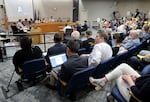In many ways, Henry Hunker is a typical pre-teen.
He loves hanging out with his friends. Playing with his dog. And watching WWE wrestling.
The 11-year-old is also a big fan of soccer. Manchester City is his favorite team, and Kyle Walker is his favorite player. After all, Walker plays the same position as Henry — defender.
But Henry also has some unique physical challenges. Among them is Dysphagia, a medical condition that makes it hard for Henry to swallow certain foods or liquids. For some who have this kind of choking disorder, swallowing at all is impossible.
“This is probably something that my son will live with for the rest of his life,” Laura Hunker told OPB, “unless there’s some kind of major medical advance, which of course, we’re rooting for.”

Henry Hunker, 11, sits in his living room in Southeast Portland on March 22, 2024. Hunker has a choking disorder called Dysphasgia, which requires trained professionals to help assist him whenever he eats at school.
Natalie Pate / OPB
Three posters they made for a Portland Public Schools board meeting in March sat in the Hunkers’ living room on an afternoon just before spring break. Among them was Henry’s sign, which read: “Thank you, feeding team, for keeping me safe.”
A team of experts stays with Henry anytime he eats a meal or snack at his middle school in Southeast Portland. They know what Henry can and cannot eat: popcorn, carrots, grapes, hard candy, and gum, for example, are prohibited. The team also reminds him to drink water and ensures he doesn’t choke. They helped arrange for Henry to get a snack at the end of the day, like his classmates.
Without them there, he would likely have to go to the nurse’s office and miss class or time with his friends to eat, or he wouldn’t be able to eat at school at all.
“And if I do choke,” Henry said, “nobody would be there to save me.”
PPS is facing $30 million in budget cuts for next school year. The district plans to cover half of the gap — roughly $15 million — through cuts from central operations.
However, the Portland Association of Teachers has shared estimates with its members showing that proposed central office cuts could affect dozens of employees who serve students directly, many of whom support students with special needs.
Though Portland is among several districts across the state facing significant financial issues, the pushback in Oregon’s largest district has been notable.
Many PPS families, students and educators are especially frustrated with the lack of detail district administrators have provided about the proposed cuts.
Specific school-level cuts were only made public after OPB obtained records from the district and published a story. Some educators, including teachers union president Angela Bonilla, have said the numbers shared in the records are much lower than the cuts schools are actually seeing proposed now.
Parents and staff want to know what the new day-to-day will look like if these reductions are made, especially for students accessing crucial special services, like Henry.
“[We’re] talking about the most complicated, medically fragile, vulnerable kids in the school district,” Laura Hunker told OPB. “Not all of them have a voice in this process.”
Families, educators rally at April board meeting
A few dozen people gathered outside the district’s North Portland headquarters Tuesday evening to hold a “people’s school board” rally before the formal meeting began inside.
Some participants held signs calling for the district to take more action in local schools concerning violence in Palestine. Others were there to voice their opposition to a proposed policy that would allow the district to have Junior Reserve Officers’ Training Corps, or JROTC, and military recruitment in local schools.
But they all gathered outside and listened as different special education employees called for a change in budget decisions.
The event was organized by PPS union members and their allies. Organizers said they were there to demand the district reverse planned cuts to student-facing staff, particularly those who work in special education.
“There’s only one way to fight for our [special education] students, our co-workers and our communities: keep showing up,” paraprofessional Charlotte Fisher told the crowd outside. “And if it matters to you, talk about it, make connections. Don’t let them divide us.”
Ellie Baumgartner spoke to the group about her concerns as a bilingual English and Spanish speech-language pathologist. Her job is to help students and educators across the district with multilingual special education referrals, evaluations and individualized education plans.
She explained that the role was created nearly a decade ago out of a “data-driven need” to prevent students of color from being disproportionately identified incorrectly for special ed services. She said English learners or multilingual students, in particular, are twice as likely to be identified in special education.
Her role is the only one like it in the district, Baumgartner said. Yet, the current plan by PPS is to reduce the role from five days a week to two.
“This is a very nuanced and time-intensive skill that will be lost and really eroding at a focus on students,” she said, adding that the reduction was made without an explanation of data that led to the cut.
At the end of the rally, the group went into the official meeting, where some testified to the school board.

A YouTube screenshot shows students giving testimony to the Portland Public Schools governing board on April 2, 2024. Both students spoke against proposed budget cuts for the upcoming school year.
Screenshot from video/YouTube
“I understand that administrators have a lot on their plates, but communication is a crucial leadership skill. And the lack of communication with staff and the larger community is not indicative of capable leadership,” said Lisa Doane, an assistive technology specialist for the district.
Doane said the district’s special education department is trying to make too many changes, too quickly, in a way that will harm students. Her comments in the boardroom were often met with applause and cheers from members of the packed audience.
“To claim to want to embrace and emphasize the expertise of our school-based professionals, and then completely disregard the input that we give in our areas of expertise, does nothing to repair the broken relationship that has been festering for years between student-facing staff and central administrators.”
PAT President Bonilla spoke about the cuts in her union updates at the end of the meeting.
Portland lost more than 100 educators, or full-time equivalencies, in the budget two years ago, Bonilla told the board, and about 70 FTE last year. She argued the latest cuts were not caused by the teachers strike in the fall; this is a pattern.
“What we are asking for and what we’ve repeatedly asked for is transparency and meaningful community input. PPS has to be surgical with the level of cuts they are making,” Bonilla told board members. “We cannot continue to cut resources in staff that serve students and expect to meet the goals that y’all have put forth.”

Students give testimony at the Portland Public Schools board meeting on April 2, 2024.
Natalie Pate / OPB
Will Howell from the district’s communications office outlined some of the changes in a recent email. He said these changes are being made not only because of the budget but also as the district shifts to supporting more special education students in neighborhood schools versus specialized, more isolated programs. The neighborhood model has been met with mixed feelings and resistance from some in the community.
Howell said paraeducators and special education teachers are already providing feeding services and that will continue.
“Yes, we are recommending the feeding and assistive technology central teams to be reduced each by two staff members,” he wrote, “but all students requiring assistive technology and feeding needs outlined within their [Individual Education Programs] will have their needs met.”
Howell also said the district will provide physical education support so students receiving special education services can learn alongside their peers.
“This is not currently the case, with far too many students with disabilities receiving separate P.E. sections with only other students with disabilities,” he said.
Howell added that the district will continue to provide Adapted Physical Education services to students with the most significant motor and medical needs, but there will be shifts to staffing.
